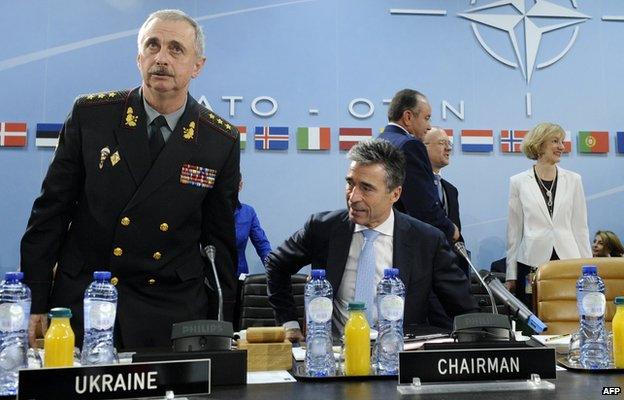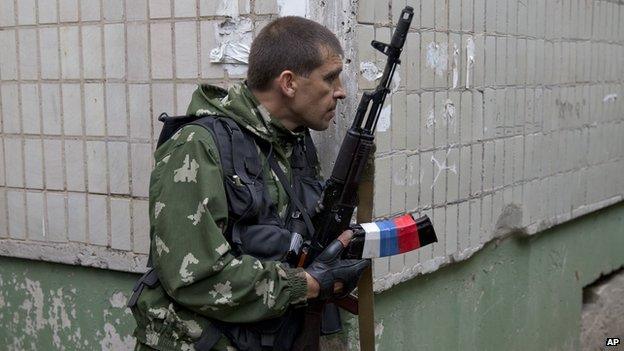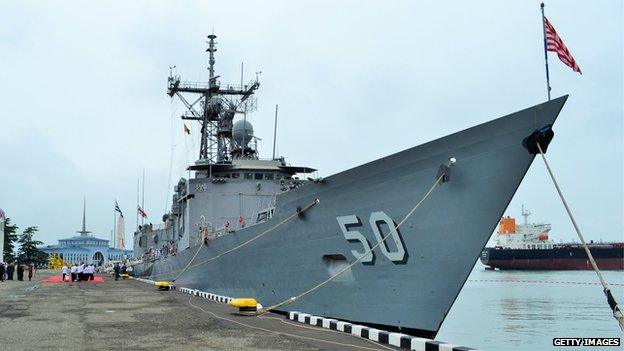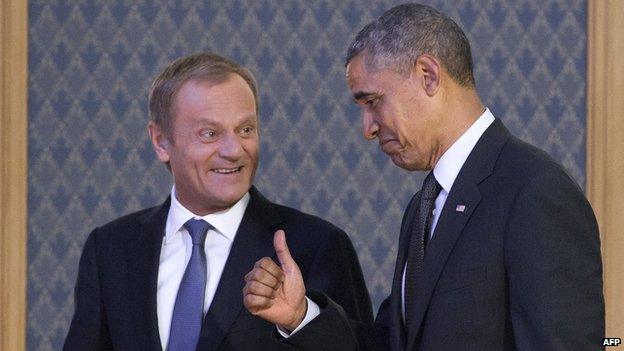Nato weighs up new strategies - and costs
- Published

Ukraine is not a Nato member but the alliance has vowed to invest more in training the country's army
The cynic might say that, in response to Russia's seizure of Crimea and its harassment of Ukraine, Nato countries have moved into high gear, launching an acronym offensive intended to set teeth in the Kremlin on edge.
US President Barack Obama, speaking in Poland, came up with the ERI - the European Reassurance Initiative - a series of steps to reassure nervous Nato members like Poland and the Baltic Republics worried by an assertive Russia that has sought to change borders by force.
The Alliance itself responded with amongst other measures a RAP - a Readiness Action Plan - a series of steps to make its forces able to respond better and faster to any crisis that might erupt in Europe or even elsewhere.
Reassuring allies
There is a real sense abroad that something has changed. The Nato Secretary General Anders Fogh Rasmussen put it this way, noting that the Alliance faced "a new security situation in Europe.

Feirce fighting erupted pro-Russian forces and Ukrainian troops continued in Luhansk on Monday
What we have witnessed in Ukraine," he said was "a wake up call." Over recent years Russia's defence spending has gone up but Nato's collective defence spending has gone down. This was, he asserted, "unsustainable."
So if something has changed the implicit question left hanging in the air is what should Nato do about it?
The answer is that it is going to do a lot more of what it has already been doing since Russia's seizure of the Crimea. There will be more training and exercises; readiness levels will be improved; and Nato will seek some additional resources.

The US has been slowly ramping up its missile defences in Europe in recent years
At a time when defence dollars are under pressure the US President Barack Obama is calling upon Congress for a billion dollars to increase the US military's ability to bolster eastern and central Europe's defences. His implicit message - the US is leading from the front.
This is not so much about deterrence. Rather, as the US initiative's name implies, it is about reassurance.
It is certainly about showing Russia that Nato is serious about the defence of its members and, by reaching out to partner-countries like Ukraine and Georgia, Nato hopes to extend that security blanket eastwards.
Who will pay?
Moscow will be watching this very closely. Nato's critics already argue that its forays into Russia's back-yard have antagonised the Russians unnecessarily. Russia is already threatening to tear up its partnership agreement with Nato if there are any permanent new Alliance bases in eastern Europe. There could be some bumpy moments ahead.

Polish Prime Minister Donald Tusk sought reassurance from President Obama during his visit to Warsaw
But this is not about a return to the Cold War. Nobody in Nato, not even the Americans, have either the appetite or the resources for a major European defence build-up.
Mr Obama has described Russia as merely "a regional power. Indeed it is a moot point what kind of threat Russia really does pose to Nato territory. But certain Nato allies are worried, so something has to be done. But there could be tensions inside Nato too. Undoubtedly more money will be needed. The old budget-sharing debate between the US and Europe may well raise its head once again.
Consecutive US Administrations have insisted - to little practical effect - that Europeans must spend more on defence.
Perhaps now the message is slowly sinking in. Poland is already raising its defence expenditure. And Britain's Defence Secretary Philip Hammond is already wondering, as European economies slowly recover, whether defence will get its appropriate share of any additional spending.
He told me: "Russia's behaviour has given Nato countries a stark reminder that freedom depended upon a willingness to invest in defence. We can't expect all of that investment to come from the United States." It's a point that many on Capitol Hill will be making too.